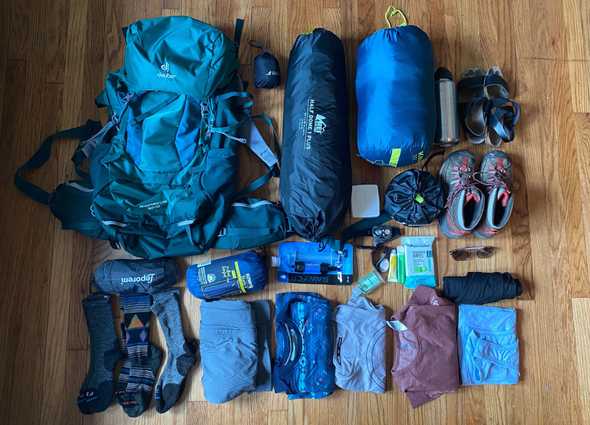Wildnerness Backpacking Gear List
In 2017, I wrote a post about planning a city backpacking trip around Europe. Well first off, a trip like that isn't going to happen again anytime soon, and secondly, I'm a bit more interested in hiking and camping in nature than exploring faraway cities and staying in hostels these days. Which meant I had to do a bit of research about different kind of tents, sleeping bags, packs, etc.
I have a two week trip coming up which involves a mountain hike with a group for the first bit and a solo road trip from L.A. to Seattle for the second bit. I've always wanted to do a Pacific Northwest road trip, and since I'll already have the hiking gear, I figure I'll camp along the way as well. I also would like to do bike camping in the future, so I have more reasons to get the gear. Here's the important gear I got and a few important tidbits I learned.
Pack
I used a 30L pack for three months in Europe and that was great, but I was sleeping in hostels every night so I didn't need any shelter or sleeping gear. I loved the Deuter I had, so I got another Deuter, this time a 60L pack. I tried on a few Osprey, Gregory, etc. but Deuter seems to fit me the best, and it's not as expensive.
I decided that the tent and all needs to be packed inside the backpack, because having it on the outside seems unwieldy and uncomfortable, and it wouldn't be feasbile for the plane. I'm still trying to figure out if I can get away with bringing it on the carry-on or if I have to check it, but I'm nervous about the tent poles/stakes so I might have to end up checking it.
- Deuter Aircontact Lite 50 + 10 – 3 lbs. 14 oz. –
$200
Tent
I needed a one-person tent, something pretty lightweight and that will fit inside a pack. Tents can run pretty expensive - usually $300-$500 - but I managed to find a good one for under $200. The biggest thing you'll notice for small, lightweight tents is they're all classified as freestanding vs. non-freestanding. Freestanding is more what you'd be familiar with from regular camping - a tent that comes with all the poles it needs and can stand up and be moved around before being staked. The alternative is non-freestanding, which are smaller, lighter, and more difficult to set up, and require being staked down and usually require separate trekking poles to be set up. Since non-freestanding is a bit more advanced, I opted to get a freestanding one, which is a more familiar setup to me.
- REI Co-op Half Dome 1 Plus Tent – 3 lbs. 11 oz. –
$179
Sleep
It's essential to get a sleeping bag and sleeping bag to shield your body from the ground. I opted for a blow-up sleeping pad since it packs smaller. I found a sleeping bag under $100 which is good considering most of the recommended ones are over $300. It packs a bit larger than I like, but it all fits fine in the 60L backpack. A pillow is optional, but a lot of thru-hikers recommended bringing one, so I got one.
- Kelty Tuck 22F Degree Mummy Sleeping Bag – 3 lbs –
$89.95 - Klymit Static V Sleeping Pad – 1 lb 2 oz –
$39.95 - RikkiTikki Inflatable Camping Pillow – 4 oz –
$16.50
Boots
I already had a pair of waterproof hiking boots. Something that covers the ankles is good, as I have a tendency to trip.
Cooking
I still need to do a little research on a stove, which I'll definitely need for coffee. Otherwise, a set with a spoon,
- Cookware Mess Kit –
$19.99
Water
There are a bunch of different kind of filters, but the Sawyer Mini seems to be the best and most popular (especially vs. the Life Straw). It consists of a pouch and a squeeze filter. You dip the pouch in the dirty water, screw the pouch onto the filter, and squeeze the pouch. The water on the other end of the filter will be good to use - for 100,000 gallons! Looks like a good $20 investment to me.
- Sawyer Mini Water Filter –
$19.97
Clothes
The big rule is to not wear cotton clothes, as cotton is heavy and stays wet for a long time. So I got some merino wool base layers and synthetic fabric clothes.
- 1 pair of pants
- 1 pair of shorts
- 1 tank top
- 2 shirts
- 3 wool socks
- Underwear
- Rain poncho
- Swimsuit (maybe)
- Sandals
Misc
- Headlamp
- Microfiber towel
- Sunglasses
- Water bottle
- First aid supplies
- Toothbrush
- Toothpaste
- Floss
- Chapstick
- Sunscreen
- Bug spray
- Comb
- Hand sanitizer
- Lighter
- Mug
- iPhone
- Headphones
- Downloaded music, podcasts, etc.
Not bringing
- Trowel (unnecessary, you can just use stakes or a stick)
- Big knife (probably just a small pocket knife at the destination)

Comments